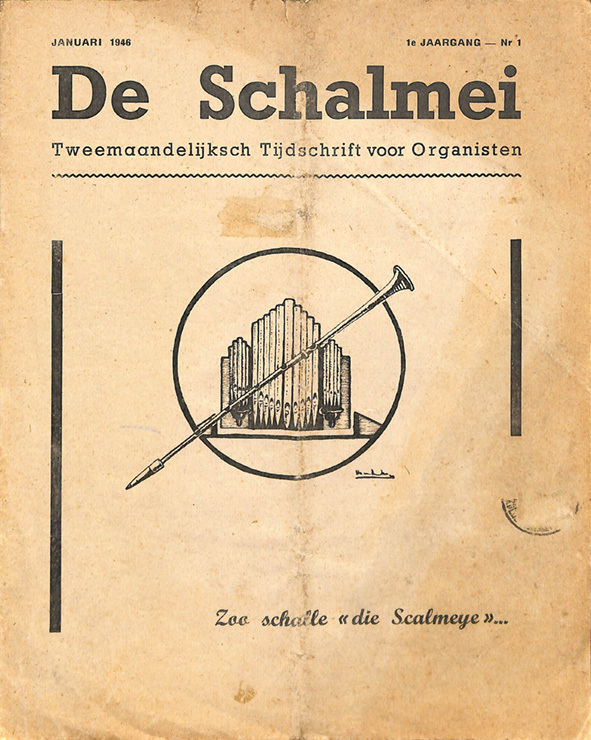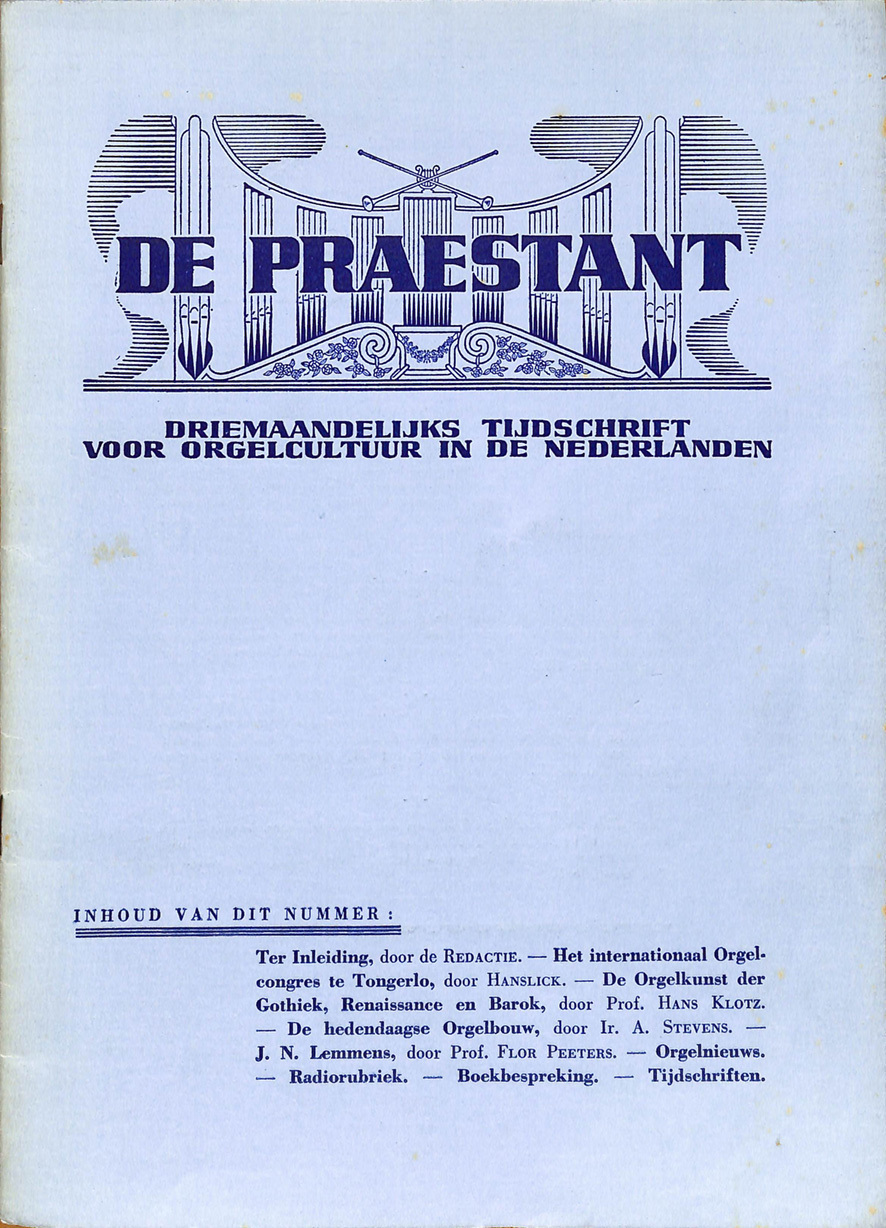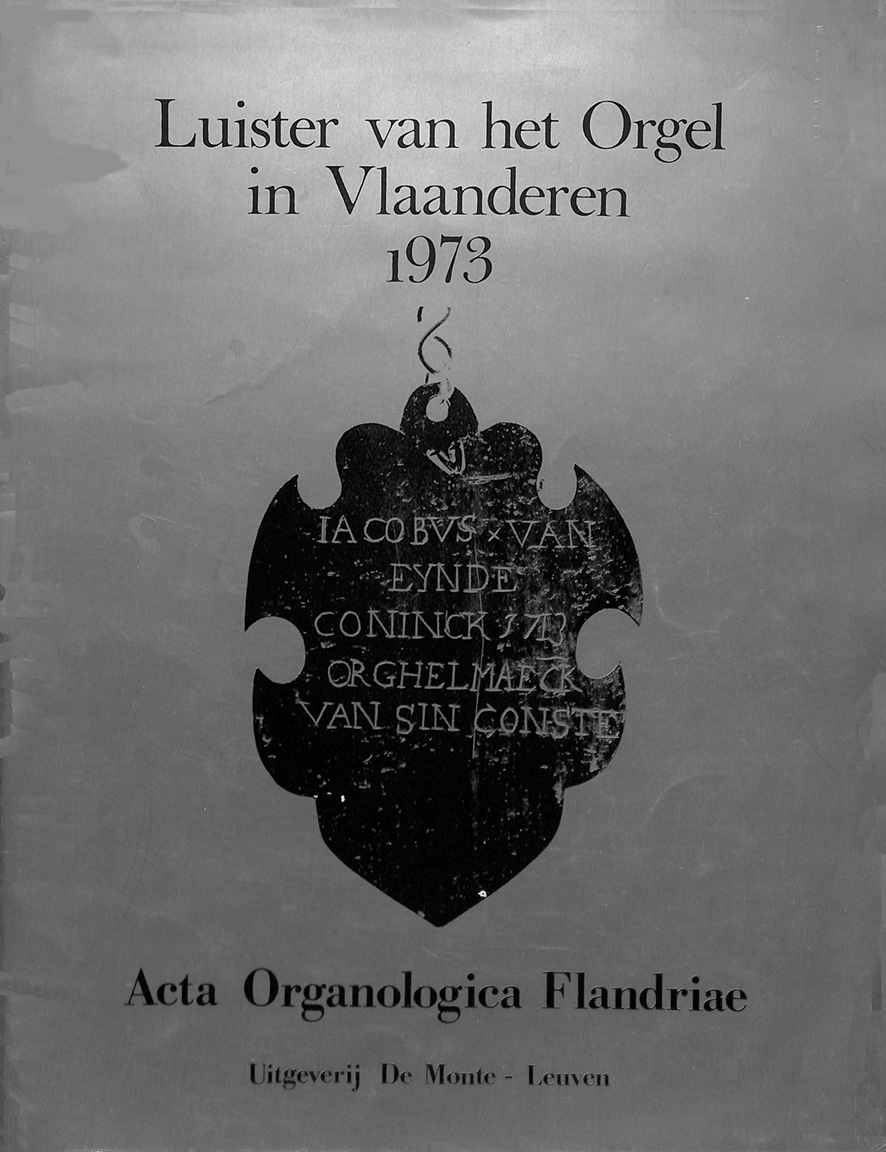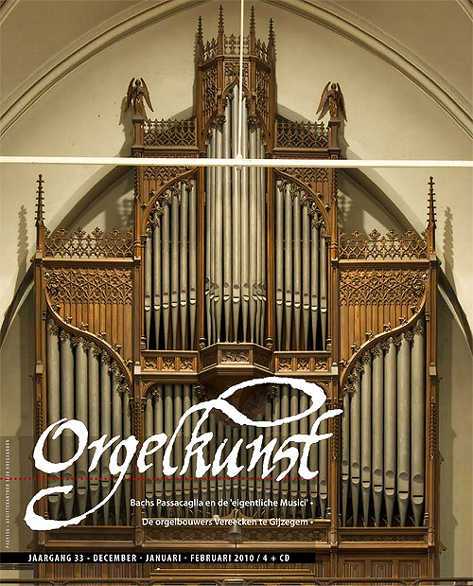History
Chronicle of an organ journal
Quite a few elements of our rich and varied organ landscape have helped to shape the international scene. Organ builders from Flanders like Brebos, Langhedul, Forceville, Le Picard, De la Haye, Van Peteghem, Van Bever, Schyven, Loret… acquired fame or were active beyond yesterday's or today's borders. And the same can be said of organ composers like Pieter Cornet, Abraham Van den Kerckhoven, Lambert Chaumont, Jacques-Nicolas Lemmens, Alphonse Mailly, Jozef Tilborghs, Jozef Callaerts, Flor Peeters, Gabriël Verschraegen...
Belgium's 19th century music journals like the Gazette musicale de la Belgique (1833-1834), La Belgique Musicale (1841-1859), Le Guide Musical (1855-1917) and Musica Sacra (1881-1940 – French edition / 1910-1940 – Dutch edition) devoted attention to the organ, but were not exclusive organ magazines.
Only after the Second World War did Flemish organ magazines begin to appear. Four periodicals succeeded one another.
De Schalmei (1946 - 1950)
Under the motto "zoo schalle die schalmey" ("the shawm shall sound") Berten De Keyzer and Gabriel Verschraegen founded the first Flemish organ review in Gent in 1946. Among its illustrious collaborators were Maarten Albert Vente, Flor Peeters, Piet Visser and Charles Vanden Borren. In the third issue of the first volume an introductory statement reveals the magazine's aims: "We want to find and study archives that have not yet been discovered or divulged, so that musicologists and historians can gain access to them and start from ascertained facts when investigating the organ history of the Low Countries. Organists will be able to correctly assess the historic value of their instruments and organ builders will be given a solid hold when restoring an instrument or designing a stoplist.
In 1950 publication came to a halt. Berten De Keyzer looks back with the following words:
"morendo triste .. ma non troppo".
"In spite of all, we can look back on a successful quinquennium. (..) The result of our study of various archives has resulted in a volume on organ history which not a single organ scholar can disregard with impunity.[...]"

De Praestant (1951 - 1972)
It did not take long before Flor Peeters and Titus Timmerman tried to fill the gap with the publication of a new organ periodical. The idea was the outcome of an organ congress held in Tongerlo Abbey 4-7 August 1951. The editorial board consisted of Charles Hens, Gabriël Verschraegen, A.Stevens, Albert De Klerk, Hennie Schouten and J.Vermeylen. After launching a specimen in 1951 the board delivered a three-monthly magazine that targeted readers both in Flanders and in the Netherlands. Each issue was supplemented by an organ score, which the board characterized as "small in size, modern in style and of moderate difficulty". More than two decades later, in 1972, the last issue came out.

Luister van het orgel I (1973)
Once more the disappearance of one organ review heralded the advent of a new one. The editorial board was composed of Kamiel D'Hooghe, Agnes Dumon, Antoon Fauconnier and Ghislain Potvlieghe. In 1973 they presented Luister van het orgel (Organ splendour), Volume I of the Acta Organologica Flandriae, published by De Monte in Leuven.
The aims were clearly set out by D'Hooghe in a canvassing letter that accompanied the first issue: "If we want to make sure that the next generation in our country can still perform on historic instruments, it must now be clearly demanded that music students should no longer be taught on bad instruments and that their interest in our organ heritage should be aroused. The craft of organ building should be safeguarded by all means. If not, we will be losing both our organs and our organ building tradition."
The undertaking regrettably produced only a single issue dedicated to the figure of the Ieper organ builder Jacobus Van Eynde (end of 17th century – †1719) with contributions by Ghislain Potvlieghe and Antoon Fauconnier. The economic consequence of the oil crisis had jeopardized the survival of this new Flemish organ periodical from the very outset.

Orgelkunst (1978 - )
Five years later, in 1978, the periodical Orgelkunst was launched. The review was the initiative of some enthusiastic and like-minded organ lovers who were concerned about Flemish organ culture and policy and were anxious to undertake a thorough study of the Flemish organ legacy, set against a background of international developments and criteria. They wanted to revitalize the Flemish organ world, highlighting the study of historic instruments and the tradition of non-industrial organ building. They were convinced that this new perspective would lead to a an ever deepening insight.
In the introduction to the first issue former editor-in-chief Kamiel D'Hooghe outlined the path to follow: "There is at present an urgent need for an organ magazine with a clear view about how we have to shape our future. We need a magazine that focuses on our specific needs and problems, and welcomes organ specialists from home and abroad. Flemish historic organs are threatened by an irresponsible bent towards innovation and by widespread confusion. To protect this unique cultural heritage, we have to inform the government about the present state of affairs. That is why a specialist scientific organ journal is indispensable. If we want our organ culture to mean something, the central premise must be the conception of organ building as a craft."
At first Orgelkunst was the product of an informal partnership between like-minded enthusiasts. On 27 October 1980 the non-profit association"Vlaamse Vereniging ter Bevordering van de Orgelkunst" (V.V.B.O.) (Flemish association for the promotion of the art of the organ) was founded. Its statutes were published in the Official Gazette (Moniteur belge/Belgisch Staatsblad) on 16 April 1981. Founding members were Kamiel D'Hooghe, Agnes Dumon, Antoon Fauconnier, Bernard Huys, Ghislain Potvlieghe en Patrick Roose. From December 1978 they were joined by Robert Deleersnyder. President of the association was Kamiel D'Hooghe, vice-president Bernard Huys and Patrick Roose undertook the tasks of administrator and secretary.

